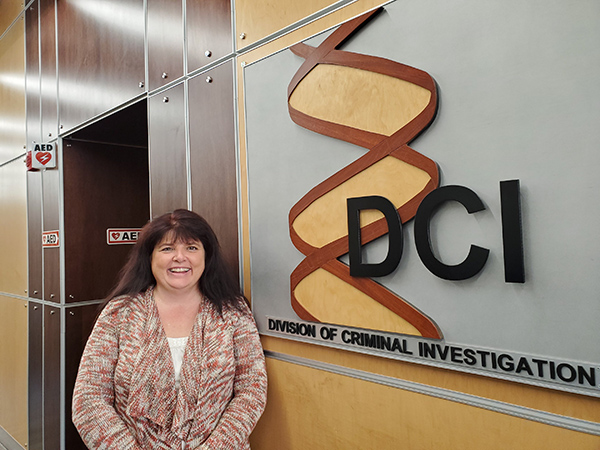Alum Janese Milam keeps criminals compliant


Even before she stepped on to Iowa State’s campus as an undergraduate in the spring of 2006, Janese Milam (’09 criminal justice and sociology) knew she wanted to pursue a career at the intersection of criminal justice and mental health. Particularly, she desired to work with individuals who were considered criminally mentally ill. Her ultimate goal?
“I wanted to interview serial killers to see what made them tick,” Milam said.
Milam’s current position as a compliance officer with Iowa’s Department of Criminal Investigation (DCI) doesn’t look like an episode of “Criminal Minds,” where she’s sitting in an interrogation room across the table from a sociopath attempting to decipher their twisted, psychotic intentions. Her DCI duties might be considered a little less dramatic, but they are no less important.
Detailed work
Milam works in the DCI’s sex offender registry division and is responsible for verifying that the state’s 6,000-plus sexual offender registrants are compliant. She tracks their whereabouts, such as their current address, who they live with, where they work, what vehicle they drive, and any new internet identifiers, like social media account names.
“When they become noncompliant, I work with counties, state and federal agencies to get them back into compliance,” Milam said.
She also shares relevant information and supporting documentation for criminal investigations and court proceedings with a plethora of county, state and federal law enforcement agencies, including the Department of Homeland Security, Immigration and Customs Enforcement, and the U.S. Marshals Service.
“I am also the primary contact for testifying in court proceedings on behalf of the Iowa Sex Offender Registry as requested or as subpoenaed,” she said.
Sound advice
Milam loves her job and considers it her best career move so far. She encourages students to consider all the possibilities a criminal justice career offers.
“There isn’t just one way to work in or be a part of criminal justice,” she said. “Everyone has to find the path that works for them.”
Milam credits Department of Sociology academic adviser Mark Hagley with guiding her toward a career where she is making a difference.
“I could always go to him, bounce things off of him, and he helped me numerous times figure out class schedules and prerequisites,” Milam said. “Because of him, I became a double major.”
Hagley fondly remembers Milam as a student, and continues to stay in touch with her.
“Janese stopped in to say hello one time when she and her daughter were visiting campus. It’s always fun to follow the progress and successes of my former students,” Hagley said.
The right fit
Milam’s advice for current criminal justice and sociology majors is to research all aspects of the legal system to determine which area clicks with them.
“Dig in and don’t be afraid to ask questions. Learn about what part of the law you’re interested in and pursue that,” Milam said. “All agencies work under a different part of the state’s code so make sure the agency you apply for works under the code that you are interested in and have a passion for. This makes the work day way more interesting and fulfilling.”